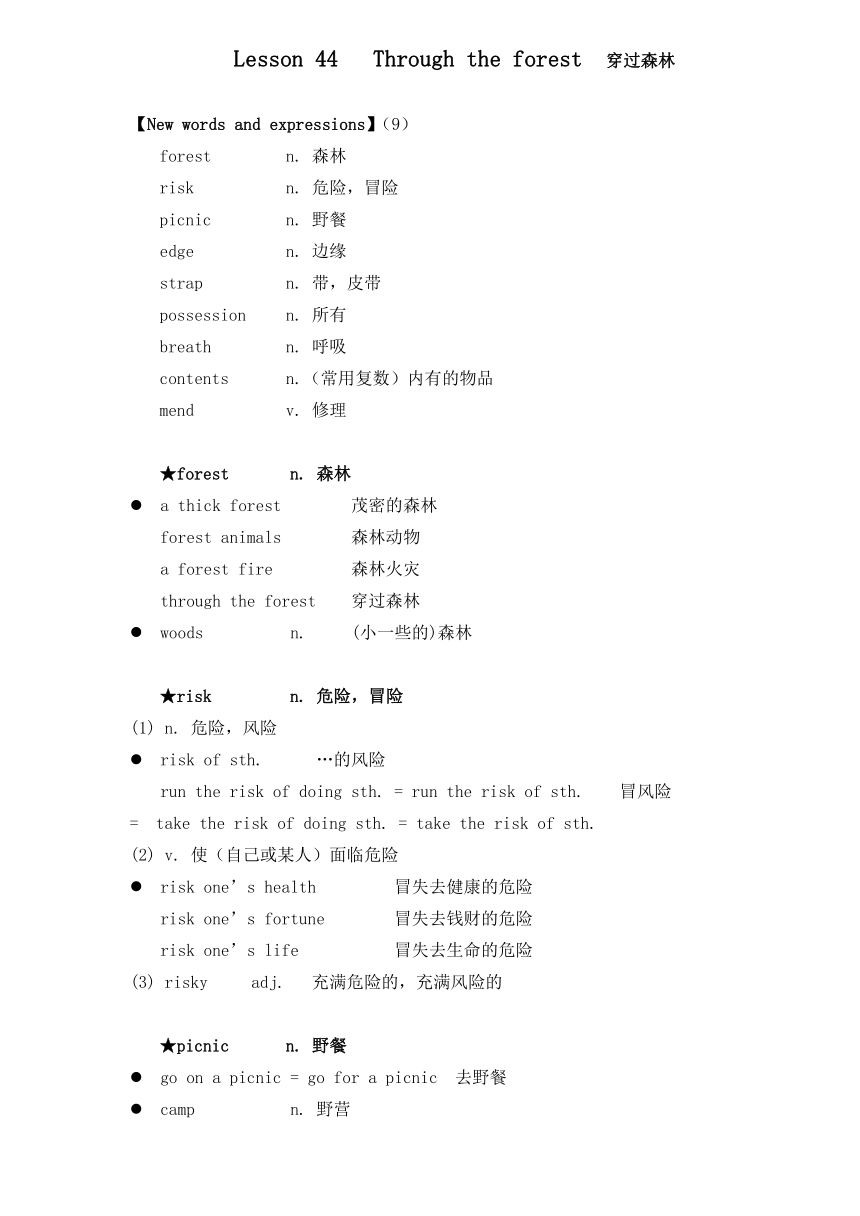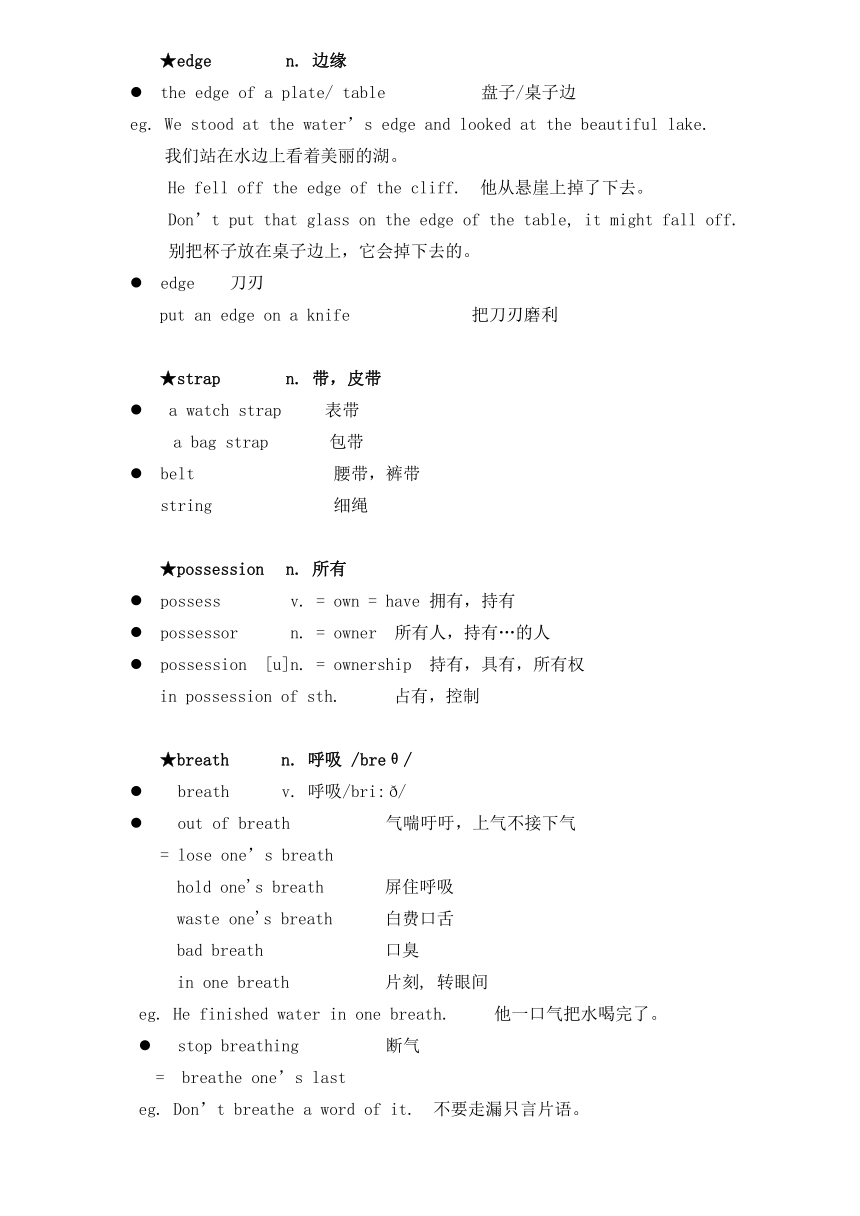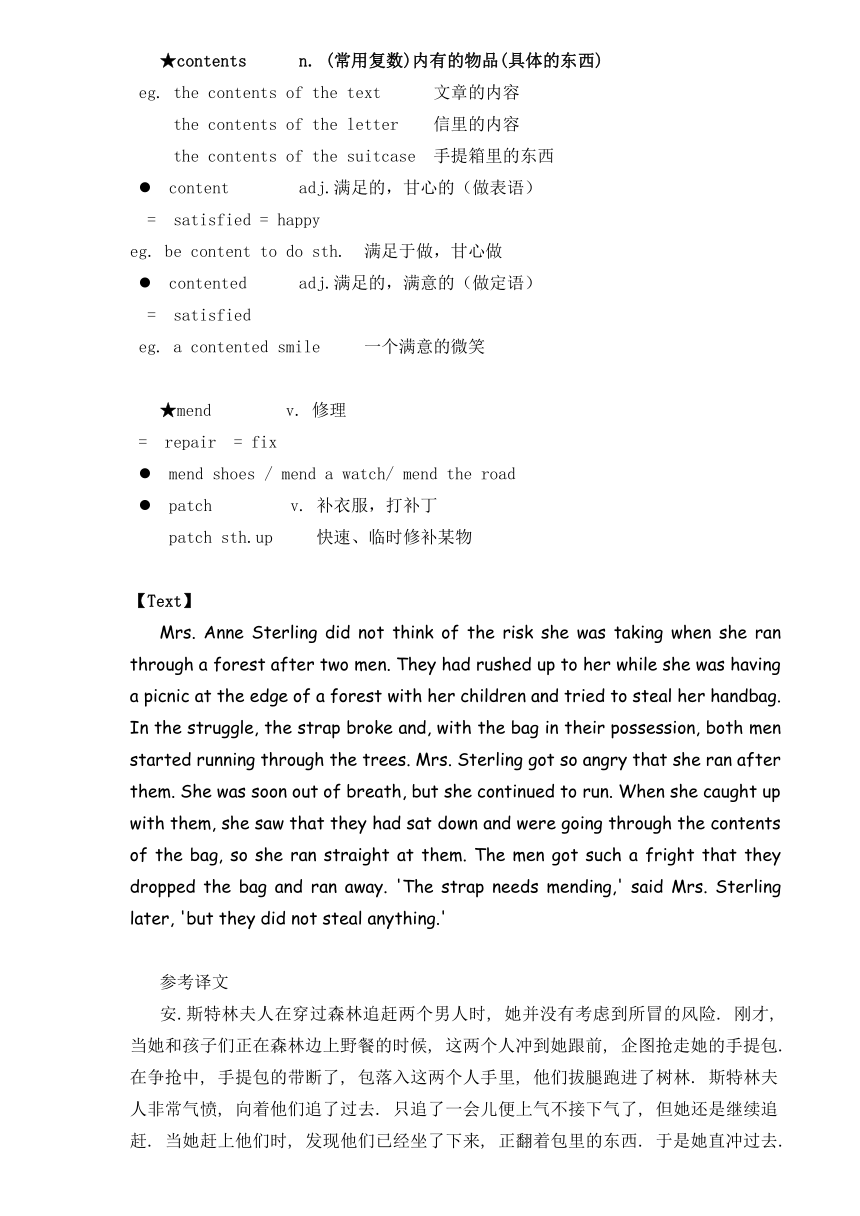新概念英语二册超详教案讲义笔记Lesson 44 Through the forest 穿过森林
文档属性
| 名称 | 新概念英语二册超详教案讲义笔记Lesson 44 Through the forest 穿过森林 |  | |
| 格式 | docx | ||
| 文件大小 | 29.3KB | ||
| 资源类型 | 教案 | ||
| 版本资源 | 新概念英语 | ||
| 科目 | 英语 | ||
| 更新时间 | 2023-09-26 06:57:46 | ||
图片预览



文档简介
Lesson 44 Through the forest 穿过森林
【New words and expressions】(9)
forest n. 森林
risk n. 危险,冒险
picnic n. 野餐
edge n. 边缘
strap n. 带,皮带
possession n. 所有
breath n. 呼吸
contents n.(常用复数)内有的物品
mend v. 修理
★forest n. 森林
a thick forest 茂密的森林
forest animals 森林动物
a forest fire 森林火灾
through the forest 穿过森林
woods n. (小一些的)森林
★risk n. 危险,冒险
(1) n. 危险,风险
risk of sth. …的风险
run the risk of doing sth. = run the risk of sth. 冒风险
= take the risk of doing sth. = take the risk of sth.
(2) v. 使(自己或某人)面临危险
risk one’s health 冒失去健康的危险
risk one’s fortune 冒失去钱财的危险
risk one’s life 冒失去生命的危险
(3) risky adj. 充满危险的,充满风险的
★picnic n. 野餐
go on a picnic = go for a picnic 去野餐
camp n. 野营
★edge n. 边缘
the edge of a plate/ table 盘子/桌子边
eg. We stood at the water’s edge and looked at the beautiful lake.
我们站在水边上看着美丽的湖。
He fell off the edge of the cliff. 他从悬崖上掉了下去。
Don’t put that glass on the edge of the table, it might fall off.
别把杯子放在桌子边上,它会掉下去的。
edge 刀刃
put an edge on a knife 把刀刃磨利
★strap n. 带,皮带
a watch strap 表带
a bag strap 包带
belt 腰带,裤带
string 细绳
★possession n. 所有
possess v. = own = have 拥有,持有
possessor n. = owner 所有人,持有…的人
possession [u]n. = ownership 持有,具有,所有权
in possession of sth. 占有,控制
★breath n. 呼吸 /breθ/
breath v. 呼吸/bri: /
out of breath 气喘吁吁,上气不接下气
= lose one’s breath
hold one's breath 屏住呼吸
waste one's breath 白费口舌
bad breath 口臭
in one breath 片刻, 转眼间
eg. He finished water in one breath. 他一口气把水喝完了。
stop breathing 断气
= breathe one’s last
eg. Don’t breathe a word of it. 不要走漏只言片语。
★contents n. (常用复数)内有的物品(具体的东西)
eg. the contents of the text 文章的内容
the contents of the letter 信里的内容
the contents of the suitcase 手提箱里的东西
content adj.满足的,甘心的(做表语)
= satisfied = happy
eg. be content to do sth. 满足于做,甘心做
contented adj.满足的,满意的(做定语)
= satisfied
eg. a contented smile 一个满意的微笑
★mend v. 修理
= repair = fix
mend shoes / mend a watch/ mend the road
patch v. 补衣服,打补丁
patch sth.up 快速、临时修补某物
【Text】
Mrs. Anne Sterling did not think of the risk she was taking when she ran through a forest after two men. They had rushed up to her while she was having a picnic at the edge of a forest with her children and tried to steal her handbag. In the struggle, the strap broke and, with the bag in their possession, both men started running through the trees. Mrs. Sterling got so angry that she ran after them. She was soon out of breath, but she continued to run. When she caught up with them, she saw that they had sat down and were going through the contents of the bag, so she ran straight at them. The men got such a fright that they dropped the bag and ran away. 'The strap needs mending,' said Mrs. Sterling later, 'but they did not steal anything.'
参考译文
安.斯特林夫人在穿过森林追赶两个男人时, 她并没有考虑到所冒的风险. 刚才, 当她和孩子们正在森林边上野餐的时候, 这两个人冲到她跟前, 企图抢走她的手提包. 在争抢中, 手提包的带断了, 包落入这两个人手里, 他们拔腿跑进了树林. 斯特林夫人非常气愤, 向着他们追了过去. 只追了一会儿便上气不接下气了, 但她还是继续追赶. 当她赶上他们时, 发现他们已经坐了下来, 正翻着包里的东西. 于是她直冲过去. 这两个人吓了一跳, 扔下提包逃跑了. “这提包带需要修理, “斯特林夫人事后说道, “不过他们什么也没偷走. “
【课文讲解】
1、Mrs. Anne Sterling did not think of the risk she was taking when she ran through a forest after two men.
think of… 考虑,思考
take a risk(of doing) 冒……风险
run after 追赶;追随;追求
run behind 在某人后面跑
run to 跑向
she was taking作定语从句修饰risk
2、They had rushed up to her while she was having a picnic at the edge of a forest with her children and tried to steal her handbag.
rush up to sb. 迎面冲向某人
up to 表示方向性、目的性
可以表示时间直到…
have a picnic 野餐
at the edge of a forest 在森林边缘
try to do sth. 企图做
steal sth. 偷东西
3、In the struggle, the strap broke and, with the bag in their possession, both men started running through the trees.
in one's possession = in the possession of sb. 为某人所拥有……
with the bag in their possession 包落在他们手里
start running = start to run
4、Mrs. Sterling got so angry that she ran after them.
so…that… 如此…以致于…
run after (不用于被动语态) 追赶(某人),追逐(某人)
5、She was soon out of breath, but she continued to run.
be out of breath 上气不接下气,喘不上气
= lose one’s breath
continue to do sth. 接着做……
= continue doing sth.
6、When she caught up with them, she saw that they had sat down and were going through the contents of the bag, so she ran straight at them.
catch up with sb. 赶上(超过)某人
keep up with sb. 赶上(跟上)某人
go through (仔细地)搜查,在……中搜寻,浏览,翻看(速度较快的看)
eg. She went through her bag, but she couldn’t find her key.
run (straight) at (at 强调瞄准,一般与straight相连都用at)
7、The men got such a fright that they dropped the bag and ran away.
such…that 如此…以致于
区别:so + adj./adv. + that
such + n. + that
8、'The strap needs mending,' said Mrs. Sterling later, 'but they did not steal anything.'
need doing sth. = need to be done
sth. needs doing = sth. needs to be done
need作“需要”意思时,后面接的动名词有被动的含义。
eg. Do you think my jacket needs cleaning = needs to be cleaned
but they did not steal anything = but they stole nothing
【Key structures】
动名词
作主语:
eg. Eating is always a pleasure. 吃是一种享受。
作介词宾语:
eg. I am very keen on cycling. 我非常喜欢骑自行车。
He sat there without saying anything. 他坐在那儿什么也不说。
I’m looking forward to seeing him tomorrow. 我盼着明天能见到他。
I am used to getting up early. 我习惯早起.
3、作动词宾语:
eg. They began running. = They began to run. 他们开始跑了。
They continued running. = They continued to run. 他们继续跑。
总结:有些动词后面加to do或doing 含义没有什么区别。
(1)在love,like,prefer等动词后,用不定式和动名词意义有所区别。
hate,love,like + doing sth. 表示一种习惯(always)
hate,love,like + to do sth. 表示某一次性的行为(now)
would love /like to do sth. 表示想要, 习惯于在前面加 would
餐厅服务员习惯会问: “Would you like to… ”,而不会用 “Do you like… ”,他只关心你现在想吃什么,而不管你平常吃什么。
(2)在need,want之后,动名词形式具有被动的含义,相当于被动的不定式:
如果以物体做主语,可以直接加动词-ing,表达被动的含义
eg. My shirt is torn. It needs mending. 我的衬衫撕破了, 需要缝补。
= It needs to be mended.
Those windows are dirty. They want washing. 那些窗户很脏, 需要洗刷。
= They want to be washed.
做表语:
eg. His job is driving a bus. 他的工作是开车。
Seeing is believing. 眼见为实。
做定语:
eg. a dining-room
a reading-room
a swimming-pool
a sleeping-car 卧铺车厢
【Special Difficulties】
catch and run
catch主要意思是“抓住、捉住、逮住”,但有时可以表示“(及时)赶上、追上”等:
He ran quickly to catch the last bus home.
When she caught up with them, she saw that they were going through the contents of the bag.
run的本意是“跑”,后面加上不同的小品词可以表达“追赶,逃跑”等多种含义:
She has run off with all his money.
The man ran away with her bag.
【New words and expressions】(9)
forest n. 森林
risk n. 危险,冒险
picnic n. 野餐
edge n. 边缘
strap n. 带,皮带
possession n. 所有
breath n. 呼吸
contents n.(常用复数)内有的物品
mend v. 修理
★forest n. 森林
a thick forest 茂密的森林
forest animals 森林动物
a forest fire 森林火灾
through the forest 穿过森林
woods n. (小一些的)森林
★risk n. 危险,冒险
(1) n. 危险,风险
risk of sth. …的风险
run the risk of doing sth. = run the risk of sth. 冒风险
= take the risk of doing sth. = take the risk of sth.
(2) v. 使(自己或某人)面临危险
risk one’s health 冒失去健康的危险
risk one’s fortune 冒失去钱财的危险
risk one’s life 冒失去生命的危险
(3) risky adj. 充满危险的,充满风险的
★picnic n. 野餐
go on a picnic = go for a picnic 去野餐
camp n. 野营
★edge n. 边缘
the edge of a plate/ table 盘子/桌子边
eg. We stood at the water’s edge and looked at the beautiful lake.
我们站在水边上看着美丽的湖。
He fell off the edge of the cliff. 他从悬崖上掉了下去。
Don’t put that glass on the edge of the table, it might fall off.
别把杯子放在桌子边上,它会掉下去的。
edge 刀刃
put an edge on a knife 把刀刃磨利
★strap n. 带,皮带
a watch strap 表带
a bag strap 包带
belt 腰带,裤带
string 细绳
★possession n. 所有
possess v. = own = have 拥有,持有
possessor n. = owner 所有人,持有…的人
possession [u]n. = ownership 持有,具有,所有权
in possession of sth. 占有,控制
★breath n. 呼吸 /breθ/
breath v. 呼吸/bri: /
out of breath 气喘吁吁,上气不接下气
= lose one’s breath
hold one's breath 屏住呼吸
waste one's breath 白费口舌
bad breath 口臭
in one breath 片刻, 转眼间
eg. He finished water in one breath. 他一口气把水喝完了。
stop breathing 断气
= breathe one’s last
eg. Don’t breathe a word of it. 不要走漏只言片语。
★contents n. (常用复数)内有的物品(具体的东西)
eg. the contents of the text 文章的内容
the contents of the letter 信里的内容
the contents of the suitcase 手提箱里的东西
content adj.满足的,甘心的(做表语)
= satisfied = happy
eg. be content to do sth. 满足于做,甘心做
contented adj.满足的,满意的(做定语)
= satisfied
eg. a contented smile 一个满意的微笑
★mend v. 修理
= repair = fix
mend shoes / mend a watch/ mend the road
patch v. 补衣服,打补丁
patch sth.up 快速、临时修补某物
【Text】
Mrs. Anne Sterling did not think of the risk she was taking when she ran through a forest after two men. They had rushed up to her while she was having a picnic at the edge of a forest with her children and tried to steal her handbag. In the struggle, the strap broke and, with the bag in their possession, both men started running through the trees. Mrs. Sterling got so angry that she ran after them. She was soon out of breath, but she continued to run. When she caught up with them, she saw that they had sat down and were going through the contents of the bag, so she ran straight at them. The men got such a fright that they dropped the bag and ran away. 'The strap needs mending,' said Mrs. Sterling later, 'but they did not steal anything.'
参考译文
安.斯特林夫人在穿过森林追赶两个男人时, 她并没有考虑到所冒的风险. 刚才, 当她和孩子们正在森林边上野餐的时候, 这两个人冲到她跟前, 企图抢走她的手提包. 在争抢中, 手提包的带断了, 包落入这两个人手里, 他们拔腿跑进了树林. 斯特林夫人非常气愤, 向着他们追了过去. 只追了一会儿便上气不接下气了, 但她还是继续追赶. 当她赶上他们时, 发现他们已经坐了下来, 正翻着包里的东西. 于是她直冲过去. 这两个人吓了一跳, 扔下提包逃跑了. “这提包带需要修理, “斯特林夫人事后说道, “不过他们什么也没偷走. “
【课文讲解】
1、Mrs. Anne Sterling did not think of the risk she was taking when she ran through a forest after two men.
think of… 考虑,思考
take a risk(of doing) 冒……风险
run after 追赶;追随;追求
run behind 在某人后面跑
run to 跑向
she was taking作定语从句修饰risk
2、They had rushed up to her while she was having a picnic at the edge of a forest with her children and tried to steal her handbag.
rush up to sb. 迎面冲向某人
up to 表示方向性、目的性
可以表示时间直到…
have a picnic 野餐
at the edge of a forest 在森林边缘
try to do sth. 企图做
steal sth. 偷东西
3、In the struggle, the strap broke and, with the bag in their possession, both men started running through the trees.
in one's possession = in the possession of sb. 为某人所拥有……
with the bag in their possession 包落在他们手里
start running = start to run
4、Mrs. Sterling got so angry that she ran after them.
so…that… 如此…以致于…
run after (不用于被动语态) 追赶(某人),追逐(某人)
5、She was soon out of breath, but she continued to run.
be out of breath 上气不接下气,喘不上气
= lose one’s breath
continue to do sth. 接着做……
= continue doing sth.
6、When she caught up with them, she saw that they had sat down and were going through the contents of the bag, so she ran straight at them.
catch up with sb. 赶上(超过)某人
keep up with sb. 赶上(跟上)某人
go through (仔细地)搜查,在……中搜寻,浏览,翻看(速度较快的看)
eg. She went through her bag, but she couldn’t find her key.
run (straight) at (at 强调瞄准,一般与straight相连都用at)
7、The men got such a fright that they dropped the bag and ran away.
such…that 如此…以致于
区别:so + adj./adv. + that
such + n. + that
8、'The strap needs mending,' said Mrs. Sterling later, 'but they did not steal anything.'
need doing sth. = need to be done
sth. needs doing = sth. needs to be done
need作“需要”意思时,后面接的动名词有被动的含义。
eg. Do you think my jacket needs cleaning = needs to be cleaned
but they did not steal anything = but they stole nothing
【Key structures】
动名词
作主语:
eg. Eating is always a pleasure. 吃是一种享受。
作介词宾语:
eg. I am very keen on cycling. 我非常喜欢骑自行车。
He sat there without saying anything. 他坐在那儿什么也不说。
I’m looking forward to seeing him tomorrow. 我盼着明天能见到他。
I am used to getting up early. 我习惯早起.
3、作动词宾语:
eg. They began running. = They began to run. 他们开始跑了。
They continued running. = They continued to run. 他们继续跑。
总结:有些动词后面加to do或doing 含义没有什么区别。
(1)在love,like,prefer等动词后,用不定式和动名词意义有所区别。
hate,love,like + doing sth. 表示一种习惯(always)
hate,love,like + to do sth. 表示某一次性的行为(now)
would love /like to do sth. 表示想要, 习惯于在前面加 would
餐厅服务员习惯会问: “Would you like to… ”,而不会用 “Do you like… ”,他只关心你现在想吃什么,而不管你平常吃什么。
(2)在need,want之后,动名词形式具有被动的含义,相当于被动的不定式:
如果以物体做主语,可以直接加动词-ing,表达被动的含义
eg. My shirt is torn. It needs mending. 我的衬衫撕破了, 需要缝补。
= It needs to be mended.
Those windows are dirty. They want washing. 那些窗户很脏, 需要洗刷。
= They want to be washed.
做表语:
eg. His job is driving a bus. 他的工作是开车。
Seeing is believing. 眼见为实。
做定语:
eg. a dining-room
a reading-room
a swimming-pool
a sleeping-car 卧铺车厢
【Special Difficulties】
catch and run
catch主要意思是“抓住、捉住、逮住”,但有时可以表示“(及时)赶上、追上”等:
He ran quickly to catch the last bus home.
When she caught up with them, she saw that they were going through the contents of the bag.
run的本意是“跑”,后面加上不同的小品词可以表达“追赶,逃跑”等多种含义:
She has run off with all his money.
The man ran away with her bag.
同课章节目录
